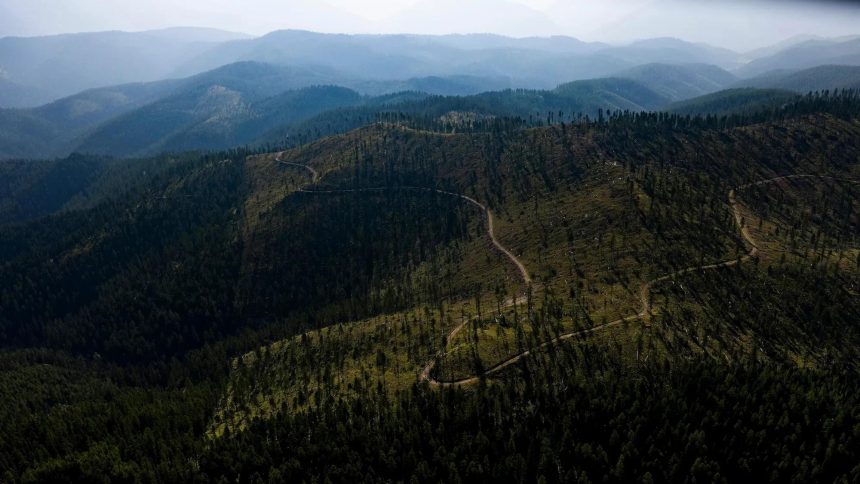This story is a collaboration between Grist and High Country News. On a wet spring day in June, fog shrouded the Mission Mountains on the Flathead Indian Reservation in northwest Montana. Silver beads of rain clung to blades of grass and purple lupine. On a ridge overlooking St. Mary’s Lake in the southeastern corner of the reservation, the land was mostly cleared of trees after state-managed logging operations. Some trees remained, mainly firs and pines, spindly things that once grew in close quarters but now looked exposed without their neighbors.
Viewed from the sky, the logged parcel was strikingly square despite the mountainous terrain. It stood in contrast to the adjacent, tribally managed forest, where timber operations followed the topographic contours of watersheds and ridgelines or imitated fire scars from lightning strikes.
“It’s not that they’re mismanaging everything, but their management philosophy and scheme do not align with ours,” said Tony Incashola Jr., the director of tribal resources for the Confederated Salish and Kootenai Tribes, or CSKT, as he looked out the window of his Jeep at the landscape. “Their tactics sometimes don’t align with ours, which in turn affects our capability of managing our land.”
This almost clear-cut, 640-acre parcel is state trust land – a small part of the 108,886 state-owned acres scattered across the reservation, despite the tribal nation’s sovereign status. The Douglas fir and ponderosa pine trees that remained in the square would thrive on the occasional fire and controlled burn after logging operations, benefiting the next generation of trees. Instead, the area was unburned, and shrubs crowded the ground. “I see this stand right here looking the exact same in 20 years,” said Incashola. It’s his first time being on this land, despite a lifetime on the reservation – the gate has always been locked due to it being state land.
A clear line divides forest managed by the Confederated Salish and Kootenai Tribe and recently harvested state-owned land. Tailyr Irvine / Grist / High Country News
Recently harvested timber sits on a parcel of state-owned land west of the town of Hot Springs, Montana, on the Flathead Reservation. In 2023, Montana made almost $162 million from activity on state trust lands.Tailyr Irvine / Grist / High Country News
State trust lands, on and off Indian reservations, make up millions of acres across the Western United States and generate revenue for public schools, universities, jails, hospitals, and other public institutions by leasing them for oil and gas extraction, grazing, rights of way, timber, and more. The state of Montana, for example, manages 5.2 million surface acres and 6.2 million subsurface acres, which distributed $62 million to public institutions in 2023, with a large portion going to K-12 schools, primarily serving non-Indigenous people.
The state trust lands that came from sanctioned land grabs of the early 20th century helped bolster state economies and continue to underwrite non-Indian institutions while infringing on tribal sovereignty. “The justification for them is very old. It goes back to, really, the founding of the U.S.,” said Miriam Jorgensen, research director for the Harvard Project on Indigenous Governance and Development. The goal was to help settlers and their families gain a firmer foothold in the Western U.S. by funding schools and hospitals for them. “There’s definitely a colonial imperative in the existence of those lands.”
However, due to instances of outdated and inconsistent data from federal, state, and tribal cartographic sources, our analysis may include lands that do not neatly align with some borders and ownership claims. As a result, our analysis may be off by a few hundred acres. In consultation with tribal and state officials, we have filtered, clipped, expanded, and otherwise standardized multiple data sets with the recognition that in many cases, more accurate land surveying is necessary.
Since 2022, the CSKT and the state of Montana have been negotiating a land exchange in which the tribe will see some 29,200 acres of state trust lands on the reservation returned, which could include the logged, 640-acre parcel near St. Mary’s Lake. In the trade, Montana will receive federal lands from the Department of the Interior and the Department of Agriculture, or potentially both, elsewhere in the state. Such a return has been “the want of our ancestors and the want of our tribal leaders since they were taken,” Incashola said. “It’s not a want for ownership, it’s a want for protection of resources, for making us whole again to manage our forests again the way we want to manage them.” Tribal nations and states have struggled with state and federal governments over jurisdiction and land since the inception of the United States. The potential return of state trust lands represents an opportunity for LandBack on a broad scale: an actionable step toward reckoning with the ongoing dispossession of territories meant to be reserved for tribes.
Relevant aerial imagery complements this article to contextualize the impact on reservation lands.






